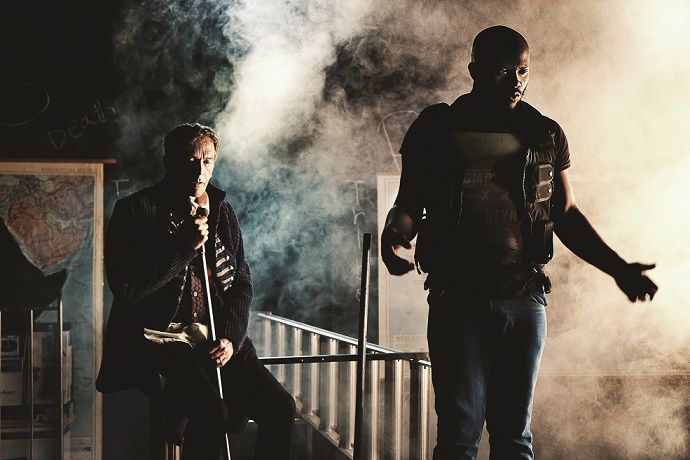CPH POST spoke to Scottish actor Matthew Zajac, who apart from playing the title role, is also artistic director of Dogstar Theatre Company, which has been co-producing the English version of the play.
Q: What attracted you to the idea of playing Mungo Park? On the face of it, he seems a rather unlikely subject for a play, being hardly a household name these days.
Well, he was a household name across Europe for a period around the turn of the 18th century. His account of his first expedition, which he miraculously returned from (4 others before him hadn’t), was translated into 10 European languages and sold across the continent. And he’s better known in Scotland, of course. More importantly, his story – and what he stands for – are fascinating. He was a rational idealist, a child of the Enlightenment, and a courageous adventurer who went on an incredible journey – twice! He arrived in West Africa in 1795 as a youthful optimist and his second expedition in 1805-6 descended into brutal colonial violence akin to what’s described in Conrad’s ‘Heart of Darkness’. So much can be taken from his story which talks to us today about Europe’s relationship to Africa.
Q: It seems to me that Park comes in at the tail end of the Scottish enlightenment and all that entails in terms of scientific curiosity, the quest for knowledge, etc. Could he have been an influence on David Livingstone?
Livingstone would have known about Mungo Park and I expect he’ll have read Park’s book, which our show is inspired by. Like Livingstone, Park was a devout Christian. Assuming he did read ‘Travels in the Interior of Africa’, the book may have helped Livingstone to understand the task he set himself and to respect the people he lived with during his years in East Africa.
Q: Park made two trips to Africa. As a result of the first one, he became the first westerner to travel central portions of the Niger River, so that could be termed a success. I know also that he came into contact with African slaves. What effect did that have on him?
You can’t get away from the fact that there was essential arrogance about the Europeans’ attitude to Africa and its people, a sense of coming from a ‘superior’ civilisation, and yet Park reveals an unusually high degree of respect for the cultures he encountered. His achievement in reaching the Niger and recording his journeys in great detail is what makes him such a notable figure. Park was a campaigner against slavery. He abhorred it, and yet he used slaves as bearers on his second expedition. We only know the details of his ultimate fate through the account of the one slave who survived that expedition.
Q: Do you see Park as merely an idealistic westerner? Surely, he is a product of his time and his attitudes are those of many of his well-educated contemporaries. Do you think that he was a religious man (like Livingstone) or more what we would call a humanist today?
As I said, he was a faithful Christian and yes, he was also a humanist and an idealist. I don’t think there’s much evidence that Park proselytised for Christianity, he wasn’t a missionary and he respected the religion and cultures he met with. His religion doesn’t really figure in our play. He was, undoubtedly, a product of his time.
Q: In the play, it is suggested that the barbarity he eventually met within himself proved to be his undoing. Could you elaborate on that? I thought that he drowned as a result of being attacked by native peoples, but don’t know the full circumstances surrounding this incident.
At the behest of the Royal Society and the British Government, Park was accompanied by 40 soldiers on his second expedition. Initially, these sponsors had planned to send 1,200 soldiers headed by a general, but Park advised that this would instantly lead to war with the numerous tribes they would encounter in the region, so the compromise was that the 40 soldiers go with him. They were heavily armed. By the time they reached the Niger from Gambia, only 11 of them were left. They sailed 1,000 miles down the Niger and came under attack a number of times on the way. Fighting with muskets and couple of field cannons mounted on their boat against spears and arrows, they killed hundreds of Africans. So the expedition turned from a peaceful mission to set up trade with Timbuktu and other West African kingdoms into a bloodbath. By the time the end came, there were six left in the boat and it seems that their only intention was to survive and hope that the river would take them to the sea. While under another attack, the boat hit some rocks. Park and the others were forced to abandon it, and all but the one slave drowned.
Q: There is a trend at the moment to re-examine our history, especially as it relates to the thorny issues of colonialism and slavery. This is obviously a good thing, as these issues still rankle. Do you see this play as part of that wave?
Yes, it’s all part of the old adage that to understand where we are, we must understand where we’ve come from.
Matthew Zajac grew up in Inverness and studied drama at Bristol University. He has worked as an actor for over 30 years, appearing in theatres throughout the UK, and in numerous film, TV and radio productions. Most recently, he has been filming The Crucifixion in Romania, directed by Xavier Gens. Matthew has also worked as a director and producer for several theatre companies and produced two films. He is currently Artistic Director of Dogstar.
















